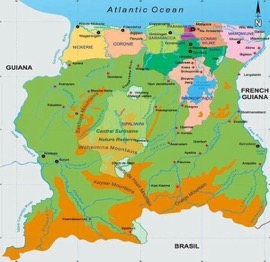Governmental Structure
1. General
The Republic of Suriname is led by a President and a Vice President who lead the Council of Ministers.
The members of De Nationale Assemblee (DNA; National Assembly of Suriname) are elected by voters from the 10 districts. Suriname is divided into 10 districts, which are all governed centrally from Paramaribo, the capital of Suriname. In district Paramaribo, most developed and populated, all the Government ministries, the National Assembly (DNA), the courthouse, the judicial committees are established. The districts have their Government offices offering several designated services, directed by district commissioners/councils who are appointed -for a certain period- and limited mandate given by the Government. In the interior, village chiefs of the various tribes are the point of contact for disputes among the villagers and between the village/villagers and the Government.
The tribes consist of several indigenous and tribal groups:
- the Kalinya’s (Caribs), the Lokonos (Arowaks) living on the coastal strip, and the Akoerio, the Trio and Wayana tribes live deeper in the interior of Suriname
- the descendants of the slaves, the Marrons (Maroons) who fled from the plantations and/or chose to stay in the interior after the abolition of slavery in 1863.
 Figure 3.2 Map of Suriname with district overview |
The 10 districts of Suriname are:
|
2. Ministries
Suriname has currently the following Ministries:
| 1. | Agriculture, Animal Husbandry and Fisheries |
| 2. | Defense |
| 3. | Education, Science and Culture |
| 4. | Finance |
| 5. | Foreign Affairs |
| 6. | Home Affairs |
| 7. | Justice and Police |
| 8. | Labor |
| 9. | Natural Resources |
| 10. | Public Health |
| 11. | Public Works, Transport & Communication |
| 12. | Regional Development |
| 13. | Social Affairs and Housing |
| 14. | Spatial Planning, Land Management and Forest Policy |
| 15. | Sports and Youth Affairs |
| 16. | Trade, Industry and Tourism |
Table 3.1 Ministries of Suriname (website DNA: www.dna.sr/wetgeving)
The two most responsible ministries regarding the extractive industry within the scope of this EITI report are:
- The Ministry of Natural Resources (MONR)
- The Ministry of Finance (MOF)
